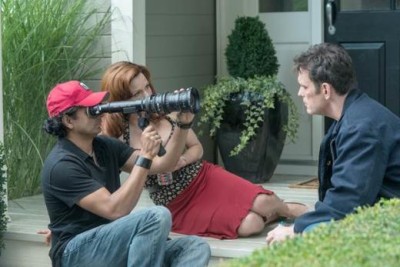After the tumultuous events of the show’s fifth episode, M. Night Shyamalan, executive producer on FOX’s Wayward Pines (Thursdays, 9/8C), spoke with a group of journalists/bloggers about thosee revelations and why they were made. He also teased the second half of the season (as much as he could).
If you’ve been DVRing the show, you might want to not follow the jump. There are key revelations in the conversation.
Hi. Thanks so much for talking to us today. It’s great to talk to you again.
M. Night Shyamalan: No problem.
Last time when I talked to you, you talked about the decision to put the reveal early on of what’s going on. Even because of that, there’s still so much going on in the following episodes after that. Can you talk about keeping that pace going, and did it make it easier having only ten episodes as opposed to a longer run?
Night: Yes, very much so. I don’t know if when we spoke earlier, if I spoke about the original intent—at least when I was talking to Fox initially—was to do 12 or 13, and then we started to outline it and it did have a little vamp feeling in there. There were a couple episodes that I just couldn’t get enough teeth in it that it felt like I was vamping for the more tentpole episodes. We talked to Fox, and Fox felt the same way. They said, “Well, what do you think about doing ten?” and I said, “That’s probably what this story wants to be at least the one that I’d outlined from Ethan waking up in the forest to the last episode.” I could see it very clearly as ten and how the architecture works with the fifth episode being letting everyone in, at least, on the big picture of what’s happening. For me, Episode 5 and 6 are the answers episodes. Then for me, post that, is the “Oh my God, how are we going to deal with what we know now?” There’s a specific thing I wanted to aim at in my head. I had it in my head that I wanted to get to this big moment that is basically in 9 and 10. I knew I wanted to aim there. For me, when I was pitching it to Fox, what the season looked like, I was like I wanted to get to this—and I’m avoiding saying what it is because I just don’t want to ruin it for you guys—but the format was critical. And I think that’s what’s so beautiful about doing television right now is you can fit the form to the subject and not the other way around which is a great benefit to storytellers.
Great and then as a follow-up. Do you have a favorite kind of surprise moment or reveal—there’s a lot and there’s a couple big, but is there one that—
Night: Yes, let’s see. I did perversely enjoy when Juliette got it, although I loved her, too. I loved her as an actress. It was so sad because we were having such a great time and I was bumming about doing that to her, but the more that you love her the better it is. So that was probably the most perverse of them, but there’s one to come—that is the thing I’m referring to you—that for me is what the piece has been moving to and that happens in end of 8 into 9—in that area.
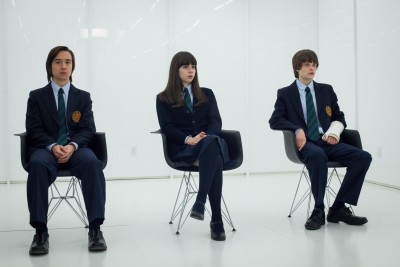
WAYWARD PINES: Ben (Charlie Tahan, R) and two other Wayward Pines Academy students (L-R: guest stars Samuel Patrick Chu and Sarah Desjardins) go through orientation in the “The Truth” episode of WAYWARD PINES airing Thursday, June 11 (9:00-10:00 PM ET/PT) on FOX. ©2015 Fox Broadcasting Co. Cr: Liane Hentscher/FOX
I was wondering, a lot of the book readers said that last night’s episode is pretty truthful to the book. Number one, how much did you desire to do that, and number two, does it move away from the book as the series goes on?
Night: It was an interesting process because Blake hadn’t actually written two. He was writing two while we were writing the season as well, so there was a lot of co-mingling of ideas and inspirations. It was super healthy on both sides in terms of suggesting, proffering ideas of which way the world could go. I think for both of us, for Blake and I, that the subject, it just is so rich and fraught with social ramifications and plot ramifications that we were just really excited about where everybody was going—the writers. I think Blake was inspired by some stuff, and we were really inspired by some stuff. But I think we mutually decided that after the big reveal we could just explore different aspects of it together. I know Blake has been super supportive about everything. There was some invention as we went, but I was hugely aiming at this one idea that happens in Episode 9-ish, that was important to me.
I’ve really been enjoying the episodes and I wanted to know if you have been keeping track at all of what people said on the internet and whether the results have been what you’d hope for in terms of both fan response, critic response, and ratings?
Night: I don’t normally check all of that, but my office has been all over it and so excited. From what I understand, everything has exceeded my expectations. The audience reaction—there’s such an intense attachment to the show from those that are watching it and I hope those who are going to start watching it now after all this—because we keep, luckily for us, growing and as I understand it, that’s a very rare thing these days in television. I’m very proud of that—that the people that have watched it have recommended it so strongly that others are adding on each week. Our last episode was our strongest, and I assume last night was even stronger and it’ll keep on growing. That’s a really great feeling.
I feel like critically I couldn’t have asked for any more, and audience reaction feels pinned in such a positive, supportive way, just beyond my expectations. It’s my first time doing television and to be embraced so generously, it just couldn’t have worked out any better. For me, to some extent, the way we structured even the airing of the episodes so that there was a break right here after Episode 5 was with the hope that at this point—we didn’t know whether we would have a fan base that would talk and spend time and try to tell everybody, the strategic intent was to give it a little break after this, as we get to the last five, to get everybody to get caught up. That’s the beauty of doing ten episodes. For me, I’ll tell you, I’m a lazy viewer so you need to tell me 20 times that Game of Thrones is great before I watch it. It’s literally like that, and then I watch it; or Breaking Bad and then I watch it. I’m like “I’m not going to watch it unless I know it’s great.” I’m hoping that the fans that’ve been growing, that they can tell a lot of people. We have this break here—which is everybody can watch it on Fox Now and Fox On Demand. The way people consume is so different now and we were kind of counting on it. The nature of the show is one that is addictive and one that rewards you every week and is one that you can grab onto and join on quickly—watch five episodes. It’s like, for example, you never saw an episode and you watched all five now over this next week. We’re imagining there’s a huge amount of audience that is going to do that and then watch the second half with us.
I was wondering, TV has changed what they mean when they say things like mini-series, limited run, etc., if it continues to be successful, will there be a second season?
Night: It’s all very pliable and fluid. I think what’s so great about this format, event series and all that stuff, is it feels so complete and it was wonderful. We have the particular advantage in our case because of Blake Crouch and his books that he kept writing and he kept thinking of stories. We also have the fact that the world that he created is so rich and fertile that it wants more stories, whether we ever decide to or not is a separate thing, whether Fox asks me and we talk about it and all that stuff. I don’t know—I mean, I’m open to it. It’s just I’m so happy that the format, in and of itself, seems to be working the way it was intended, the ten episodes. I can’t speak for other limited series and all that stuff, but it’s a beautiful thing that you can aim with intensity at a storytelling style that I think imbues it with some integrity and if that integrity then merits another story that’s a wonderful thing.
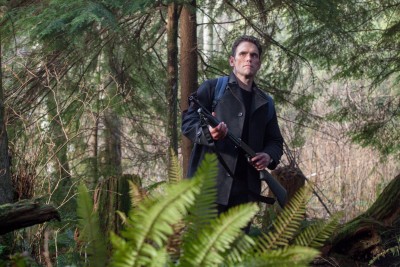
WAYWARD PINES: Ethan (Matt Dillon) ventures out of Wayward Pines in the “The Truth” episode of WAYWARD PINES airing Thursday, June 11 (9:00-10:00 PM ET/PT) on FOX. ©2015 Fox Broadcasting Co. Cr: Liane Hentscher/FOX
I’ve read the books, and so as I’m watching the TV series I’m noticing the changes and I’m curious, especially in last night’s episode where you have the big revelation comes in a way that’s totally different than in the books. I was wondering, how do you approach that kind of expositional change? What are the reasons for it, and how much work does that take?
Night: The Duffer brothers, who wrote that episode, were at my house and we spent a great deal of time talking about how that’s done. I watched it again last night with my family as it was aired, and I immediately was thinking about all the story meetings at my house where we were talking about the structure of this episode and Episode 6, what is the order of the information and how it’s revealed. It is a puzzle that needs to be unraveled just carefully. Thinking of the coins and how you start with this and then what do you start with—and then was like we start with the abbies first. We introduce the abbies first and explained that, and then say, “Well, that’s not possible.” That’s what that lunch episode was about, that doesn’t make any sense because how can you evolve, that takes forever to evolve. So you’re leaving out a huge chunk of information, then you use the coin. Then you’re using, cinematically, Matt finding the abbies in person, finding the sign in person, finding the post-apocalyptic city in the distance at the same time that that’s going on. Then in a minor way, the wife is finding out through the new tenant, Wayne Johnson, about the pods that they were put in and everything dovetailing together to give you more of the picture rather than it being a monologue. We wrote it first with a monologue from Pilcher and I was like this is just too much literary information, and we’re going to have to make it visual. It was a great exercise. The Duffers—I was really, really proud of their writing. I mean, the Duffers wrote a lot of the episodes and they just did a great job; they’re great filmmakers.
Plus, it also gives you a chance to get to know other people in the town and a little bit more about them; so it’s kind of a win-win.
Night: It is. It is. You’ll see that I was very enamored with the social implications on the young when one indoctrinates them into a belief system. I’m always interested in these kind of moral choices of, “Do you kill?” “Would you kill five children to find the cure to cancer?” that kind of thing. Those kind of moral dilemmas. That’s what really drew me to this story and what really fuels the remaining five episodes.
After last night’s episode it seems like Theresa is the only member of the family that has no idea what’s going on in Wayward Pines. Can you talk a little bit about how she’ll come to find out and when?
Night: Soon. She’ll find out soon. I can’t tell you how and all of that stuff, but definitely. That’s also a fascinating part of the conversation. It’s intimated—it’s touched on there, in the indoctrination scene of the children, but that will be expanded on over the next episodes of what the differences between adults in this situation and children in this situation and which one has a handicap and which one has an asset.
Night: It’s a big deal. The kind of—I’m trying to—the reason I’m stuttering—I barely ever stutter. The reason I’m stuttering is I’m trying to avoid everything that’s popping into my head to tell you.
It’s okay. No problem.
Night: I’m dancing around every answer. I so want to have this conversation with you.
I want you to have it.
Night: It’s a fascinating thing to—they reference the ark and Pilcher’s intentions to make an ark. There’s a way—gosh, I’m trying not to avoid telling you everything that’s going to happen. There’s a thing that we take for granted because there’s so many of us right now that freedom and lack of rules or flexibility of social environment is a given—that’s a right. But if there was only X number of us, does one of us get to jeopardize the group? Well, no that couldn’t be allowed, right? Those kinds of freedoms couldn’t be allowed because there’s so few of us, so we’re going to have to make really stringent rules. So this kind of mentality—I’m really dancing around it—but this kind of thinking of how valuable this last group is and to what extent would you go to make sure that that group expands. It pushes all moral things that we take for granted right now because there’s seven billion of us.
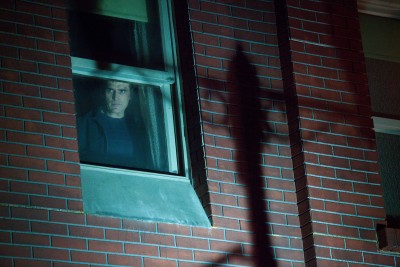
WAYWARD PINES: Ethan (Matt Dillon) looks out onto Main St. in the “Our Town, Our Law” episode of WAYWARD PINES airing Thursday, May 28 (9:00-10:00 PM ET/PT) on FOX. ©2015 Fox Broadcasting Co. Cr: Liane Hentscher/FOX
Right. Okay. Well, thank you very much.
Night: I’m dancing around it, but you can imagine when we’re talking about so few of us, how precious those children are.
Right. Yes. Exactly. Well I’m interested to see how it plays out over the rest of the season.
Night: Yes, well you can assume it’s not going to be warm and fuzzy.
The projects that you work on always have great, really shocking twist and turns. And I’m wondering what you like about that facet of storytelling and why is it important to you?
Night: You know it’s funny, I don’t think of it that way. I know that’s how it’s taken, but I don’t see it that way, I don’t think of it that way at all. In fact, when I think of it like that it becomes thin and meaningless. It is all a continuation of character’s awareness for me. If I put myself in the shoes of a main character and that person is learning more about their world, more about their situation, that feels very organic to me. Things aren’t right, I’m feeling clouded, obscured. I’m feeling like suffocated, why, why, why, and getting those answers feels very organic. It’s an increasing of our main character’s knowledge. Are they ready for that? Did they misunderstand something fundamental? When I think of it more from the character’s perspective, it feels much more exciting for me to tell these stories, because then what my job is as the storyteller is to make you in sync with the main character so that your misunderstanding is the same as theirs and every piece of information that they have you have, and you’ve misunderstood it the exact same way. Then when it comes, it should’ve been inevitable in retrospect.
Alright. Your show has a great cast. It’s a cast that has been shrinking in the past couple of episodes. I’m wondering, what was the conversation like with the actors that have been axed? Did they buy in immediately or did they need some convincing?
Night: I’ll be honest, there were a couple of conversations where they were begging to live a little longer and I was like, “Man, I’m sorry. This is Wayward Pines, this sh** happens. I’m sorry.” It was hilarious conversations, and they even pitched me stuff, “Maybe I’m not really dead and I got severely hurt and I can get back up again.” Then I was like, “Maybe, maybe. Let me think about it.”
It’s sweet actually. The conversations were super sweet in terms of they wanted to be in it, and they were so supportive. All the actors were—it was a great team of actors that really loved the idea and loved the premise so much and they were super supportive of everything. Really, it’s funny, I feel very tied to all of them in almost an equal way. Even if they were in three episodes or four episodes or all ten episodes, they feel very attached to the piece. It’s strange, even Juliette for example, feels so embedded in the whole piece, and she feels, from her point of view as well, very committed to it.
I just wanted to talk a little bit about the opening scene from the next episode, because the way we left off last night which is such a great way to leave people hanging for about a week. Then, of course, we’ve seen it weeks ago, but I was anticipating last night so that everyone else could see it, and now I’ve seen the beginning of the next episode. Immediately it just sucks you into this other place, and you’re like what the heck just happened. Very well shot by the way, beautiful. My question is, so now are flashbacks going to be playing a huge role to get the audience up to speed on how we got to where Wayward Pines is today, and how long will the flashbacks be continuing?
Night: That’s such a great thing you’re bringing up. This is my—I’m a crack addict when it comes to flashbacks. It’s just my thing. I just find it so moving when we can go back and see how someone—where they came from or how they got here or how the couple got to a problem and all that stuff. For me that was the beauty of finally getting to tell everyone in 5 and 6, I could start to go backwards now and tell you how we got here. The how we got here from all the characters’ perspective is so exciting. It was something that—and you’re really tapping into what the structure was that I fell in love with at my house when I had the writers here and I was like this is the structure, let’s go back and tell how we got here.
Yes. I love back storying. I’m already thoroughly enjoying it, which brings me to my follow up. When we first spoke, we talked about the casting of Melissa Leo and how brilliant that was and her character just being so creepy and eerie and hateable. Now we’re going to this next episode and we’re seeing her in a very different light when the episode starts. We’re starting to see her a little bit more as a person.So my question, I guess, is with whatever you can reveal, how long is that going to last or are we really going to go back and still hate her?
Night: There’s two answers to that. One is it’s always exciting for me to take an audiences’ presumptions, especially ones that I’ve reinforced, and then deconstruct it. So basically take a two-dimensional perspective on a character and then why did they make it three-dimensional by the end of our story. There will be a fascinating re-evaluation of different things in this piece. The bad guys, who are the bad guys, who are the good guys, will become much blurrier as we go along, which I love. That’s a critical thing. I’m dancing around certain things. I’m trying to think—there was one other thing I wanted to say—I’m blanking on what I was going to say. Shoot. If I remember it, I’ll jump back in and say it.
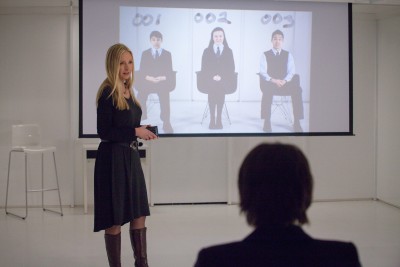
WAYWARD PINES: Megan Fisher (guest star Hope Davis) holds an orientation with new students at Wayward Pines Academy in the “The Truth” episode of WAYWARD PINES airing Thursday, June 11 (9:00-10:00 PM ET/PT) on FOX. ©2015 Fox Broadcasting Co. Cr: Liane Hentscher/FOX
No problem. It’s definitely going to be interesting. I can’t wait to see how the characters sort of evolve and change my mind on some things.
Night: Yes. Oh, I know what I was going to say. Because it’s a very blurry, moral question, that’s where your decisions on who’s a villain and who’s not will come into play. Most probably there will be a division in what people think, like, I would do anything given these circumstances, or you can’t live like that, you should rather die out then do these things.
So last question, I think this is a pretty good one to kind of close everything out. You’ve revealed in the most recent episode the truth of what’s going on and we know that what’s going to follow is how are the different characters reacting and can they handle the truth, can they not. Do you think if you ended up in Wayward Pines tomorrow, memory’s lost, everything’s changed, do you think you could handle it?
Night: I’ve asked this question to myself. You know what, if I had my family there I think so, but if not I’m not sure.
Do you think you’d try to discover more of the mystery of it or just nope, this isn’t for me, see you guys, scenario?
Night: You know what, I think I would try—I’m not very good with authority period, so I don’t know how that would work out. I probably would do very Ethan-like things and ask a lot of questions and keep pounding away at least I think. Maybe in that circumstance I’d be so scared I wouldn’t do anything, who knows.
Very cool. Thank you so much.
Night: Thank you.
Kim (Moderator): Night, did you want to have any other closing comments before Vickie gave any of the replay information?
Night: No, I mean, I guess other than that, that we’ve really hoped that the excitement about what they’ve seen will cause everyone to tell their brothers and sisters and cousins and they can catch up on the five episodes and binge watch them. When we were editing them I used to binge watch them to see how they played if I was the one binge watching them, and I loved the arcs of what you see when you watch them together. You’ll see more of the things that we talked about, either this time or the last time we were all talking together, the architecture of mystery to the reveal of the tentpole of the answer, and then subsequently where we’re going to go to in 9 and 10. So it plays in a long form as well. It plays in these little pieces like the TV viewer format, but because of the way you consume content now, it almost has to exist in a different form and in this kind of watching it in binge form. So hopefully everyone will enjoy that form as well. I want to thank everybody for coming on and talking about it.
